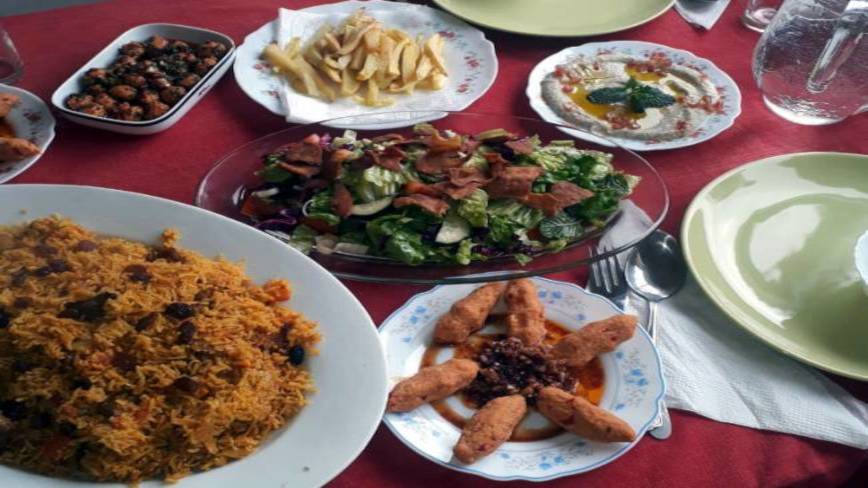
Published
No, it wasn't a typographical error. If you split the word in half and add an article in the middle you get "break the fast" , and if the invitation comes from a Muslim friend, then all is clear, isn't it?
It may be clear but I refused the invitation anyway, made to me during Ramadan three years ago. My friend said that if I fasted for a day she would invite me to break the fast at her house.
I told her I couldn't possibly do that. Ask anybody who knows me; always hungry and, if away from home, always concerned about when, where and what we are going to eat. How could I go for seventeen hours–from dawn to sunset–without food or water? Why would I do this to myself? It made no sense.
I knew, because my friends told me, that their friends or colleagues sometimes fasted with them. I admired their solidarity; but it wasn't for me.
Then somebody closer to me decided to fast for a day with his Muslim work colleagues and something stirred inside me. If he could engage in this act of solidarity, why couldn't I?
So, three years later, I asked my Muslim friend if the invitation was still open. We agreed it could be on a Saturday because I couldn't possibly imagine working all day without food or water.
I put the alarm clock on for 3.15 am, got up and fried two eggs, which I ate with bread, followed by fruit and water. Then at 4.00 am I went back to bed. I woke up around 9.00 am.
It was such a hot day! I was already thirsty! How on earth was I going to get through the next twelve hours without any water? "And you're missing a great opportunity to go to the beach" , whispered my monkey mind.
Saturday mornings I sing in the local choir. I might not have been working but I still intended to go to the rehearsal. So, off I went as usual. I wasn't hungry yet and I was surprised how I managed to forget my thirst. It also felt good to harbour this little secret inside me while I sang!
My Muslim friends had told me that one reason to fast is to become aware of what it is like for people who don't have food. It was an exercise of inner discipline; you could eat and drink but you chose not to.
In earlier years I had eaten in front of my fasting friends. Sorry, but you have to understand that I have to eat! They calmly nodded their heads and told me to go ahead. This year I had arranged things so that my family would not eat in front of me. They could eat calmly on their own while I kept myself away from temptation.
By 14.30 pm I was starting to feel those hunger pangs and I had a headache. Only seven and a half hours to go, I told myself. I curled up in bed and slept for about an hour and a half. Then when I woke up, I spoke with a close friend over the phone and that made me forget my cravings and headache for a while. After this, I sat and watched Lord of the Rings–a favourite family film–with my son, to pass the time.
And as the countdown began, I realised that I could do this after all! Before I knew it, the time had come for breakfast at 9:00 pm.
Water, water was what I craved for most! Our poor host had to keep returning to the kitchen to fill the jug. Then, yes, I broke the fast with my friends, eating small amounts as slowly as I could.
It was only the following day when I woke up and had breakfast at 9.00 am, followed by lunch and dinner, that I fully appreciated my fortune of being able to eat and drink whenever I chose to. And what struck me most that day was that each time I sat down to eat, I wasn't actually feeling very hungry. I can now go for longer periods, if needs be, without eating. I still feel the hunger pangs but don't panic about feeling them anymore.
A friend with whom I had shared my experience was curious to know why I had decided to fast. Apart from wanting to engage in a form of symbolic solidarity to experience firsthand what it felt like, it was also a means of challenging preconceptions about my own limitations.
I discovered that to feel hunger pangs was something that I could not only endure for longer than I thought, but that I could also embrace the experience. It gave me a sense of inner freedom, but also a feeling of humility towards my own body and towards all my Muslim friends who don't just fast for a day, but for a whole month.
Next year I hope to fast for more than a day–maybe even on a work day so that I can understand a bit more what it feels like. This is, after all, the hallmark of anthropological fieldwork: not just to observe but to participate in people's lives.
My research is about migrant and refugee integration policies and practices in Portugal. Of course, not all migrants and refugees are Muslims, but I realised that my initial refusal to accept the invitation to fast limited my perspective: not only as a researcher, but as a person.
Originally published on PopAnth.